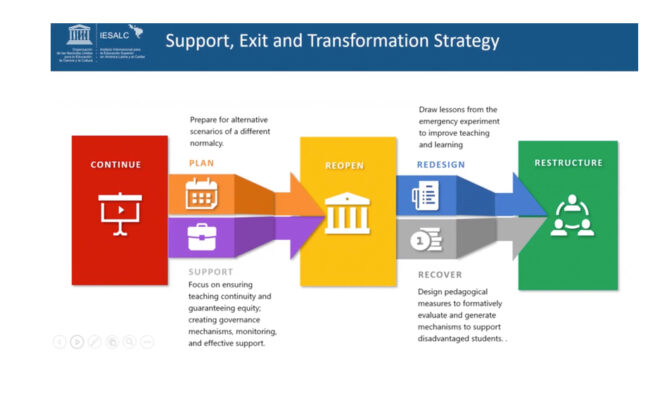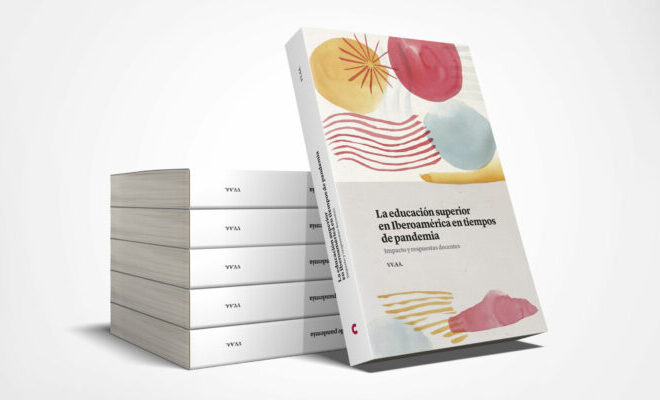How do universities guarantee pedagogical continuity and plan for the future? Emerging contributions of the first forum of rectors in face of the COVID-19 pandemic

“This meeting constitutes an excellent opportunity for the exchange of ideas regarding accreditation and quality in higher education in the face of an unprecedented global context marked by the COVID-19 pandemic. Joining efforts to meet challenges and opportunities in all spheres of education has never been so crucial.” These are the words of Stefania Giannini, UNESCO Director-General for Education, who today opened the First Virtual Forum of Rectors of Higher Education Rectors on COVID-19 organized by the CILAC Forum and IESALC.
In response to the crisis, UNESCO has been active in analyzing data on the impact of the closure of schools and universities, advocating for the right to education, and developing strategies to address the most vulnerable students. “Inclusion, equity and partnerships are at the heart of UNESCO’s response, and IESALC is our main agent in the sector”. She thanked the panelists for acting as “true social leaders” and called on them to activate themselves with clear messages on how to articulate the reopening in the near future.
The coordinator of Higher Education, Science and Technical and Professional Education at the OEI (Organization of Ibero-American States), Ana Capilla, spoke about how the pandemic has forced universities to accelerate transformations that were already taking place, such as the expansion of distance education in the region, a teaching modality that will now gain even greater prominence. “It is likely that what will emerge is not the teaching we knew, and that we are going to a teaching that is at least hybrid. We have an opportunity ahead of us to explore a new path with maximum guarantees”. She also announced the launching, on May, of the Quality Guide to Evaluate Distance Education.
In this regard, the director of the Ibero-American Knowledge Space of SEGIB (Ibero-American General Secretariat); Félix García Lausín, stressed the great importance and responsibility of keeping academic activity running creatively, which is not easy, as well as speeding up the pace to resolve the educational emergency and giving greater attention to the training of teachers in technology for a non-face-to-face education, with equal access to education, seeking quality assurance and sharing knowledge.
At the end of the introductory block, the director of the IESALC, Francesc Pedró, presented the COVID-19 and Higher Education Report. From the immediate effects to the day after, which serves as a framework for this virtual forum. He structured his presentation around three ideas; the first, on the importance of data about how pedagogical continuity is being lived, as a starting point for reflection; the difficulties of connecting to the Internet are much worse in this part of the world, and the paradox of demanding connectivity at home while jettisoning great achievements such as TV and radio and cell phones. The second idea focused on what will the short and medium term effects be? There has been a very significant drop in demand but the hope is that it will recover 10-15% within a year. This has resulted in a reduction in fees and may lead to the closure of universities and the consolidation of others, layoffs of staff and decreased public spending on higher education. Regarding the planning for the reopening, Pedró indicated that it should be based on the guarantee of the right to higher education, and he asks himself: “To what extent are universities doing everything humanly possible to ensure that nobody abandons them?” Download the presentation
 Active leadership: the rectors take the floor
Active leadership: the rectors take the floor
Under the moderation of José Antonio Quinteiro Goris, IESALC program coordinator, the invited panelists had to answer three options of questions. The first ones are related to the actions undertaken to guarantee the continuity in education and in other fronts that would help the university community, with the support of their institutions, to cope with the impact of COVID-19. The second group refers to how the reopening is being planned and under what scenarios; and in third place, they would suggest how they believe that teaching and learning can benefit from the lessons learned during the confinement period and perhaps, be redesigned.
Delfina Veiravé, Universidad Nacional del Nordeste (National University of the Northeast), Argentina
The president of the northeastern university spoke about the pedagogical continuity, understood not only as guaranteeing the right to education, but also as a way of maintaining a presence in life and in personal projects, and in the emotional containment that the bond between the university, teachers and knowledge allows. “We have had to assume the academic and human containment of international students; we have had to repatriate students.” She mentioned the situation of many working women who now share work activities with domestic ones, from a gender perspective regarding the impact of the pandemic, as well as the role of universities, in shaping the social and economic model to be considered for the future.
Sandra Goulart de Almeida, Universidade Federal de Minas Gerais (Federal University of Minas Gerais) Brazil
The panelist from Brazil spoke about the situation of universities in her country, in a pandemic context where the death toll is 25,000 people killed by COVID-19. With all on-site research and extension activities paused, 95% of research in Brazil is focused on the health solution. They have also been engaged in information and communication work on recommended protocols and research for the wider community. “We have to think of it as an opportunity to evaluate our pedagogical strategies and to rethink the pedagogical project of the institution and the values of quality, inclusion and equity in that context, with equipment and connectivity problems”. Download the presentation
Miriam Nicado, Universidad de La Habana, Cuba
Since the pandemic reached Cuba, universities have been called by the government to eradicate COVID-19. “The Universidad de La Habana has been the protagonist in mathematical modeling, in the mapping of risk for communities. We have worked with the biomedical sector and the career commissions have worked with the curriculum”. According to rector Nicado, the work of the universities has focused on the design and proposal of three stages: a post-epidemic to temper the curricular grids, another to close the 2019-2020 school year and another 16 weeks to develop the 2020-2021 school year.
Hugo Juri, Universidad Nacional de Córdoba (National University of Córdoba), Argentina
“I think that the virtual education that has been learned so unexpectedly has made us advance to an indispensable need of the 21st century,” said the rector of Córdoba, whose university has just created a national virtual campus where students will be able to select items in multidisciplinary careers, starting with a teacher training course for virtual education. “This is the time for the universalization of higher education knowledge in the world,” he said. On the other hand, the UNC works on the design and offer of courses and trades related to the pandemic for journalists, delivery personnel, and street vendors, among others. Juri foresees a mixture of face-to-face and virtual education for quite some time.
Gerónimo Laviosa, Universidad Nacional del Este (National University of the East), Paraguay
Paraguay is experiencing the same connectivity problems as the rest of the region. Public and private universities have seen their budget reduced. But, as the IESALC Report indicates, the higher education system is trying to work together in order to not leave anyone behind. The great learning is that you have to be prepared for these situations, with a hybrid system. The AUGM (Association of Universities of the Montevideo Group) has made a report with all its universities where they have found intense participation in various topics related to the pandemic.
Rodrigo Arim, Universidad de la República, Uruguay
After highlighting the contributions of his university in the field of research, Arim spoke about the process of democratization, with all the values that this implies (access, quality and innovation), as part of the necessary responses that should be generated by universities, as actors in a broader society and in relation to the political characteristics of their respective countries. He drew attention to the paralysis of academic mobility at this time, which will continue for much longer, and its importance as a constituent part of university life, along with debate and scientific research. He also marked the differences between contingency strategies and transformation strategies, a relevant aspect to be taken into account in our Latin American and Caribbean societies. “There are asymmetries of power in university life and they must be carefully looked at because, like those of gender, they are not sustainable over time,” he said. He also called for the formation of university instances to deal with the problems of the contemporary world, such as the current one in the context of the COVID-19 pandemic.
The interventions were followed by a question-and-answer cycle by the tele-audience, which had as many as 430 participants attending the event. Because of the complexity of responding to them, it was decided to publish them on the IESALC Youtube channel with their respective replies. We include some presented repeatedly: what do your universities do to fulfill those competencies that are acquired through a practical approach? How do you think the processes of accreditation or recognition of diplomas will change in the future in the light of the current uncertainties linked to future evaluation and quality assurance mechanisms? How to mitigate the low levels of student satisfaction about distance learning processes?
After closing the question-and-answer cycle, the Director of the UNESCO-Montevideo Regional Office of Science for Latin America and the Caribbean, Lidia Brito, called for transforming societies through science, scientific knowledge with the values of the university and society, and announced the holding of a second forum of rectors with the idea of delving into possible actions of contribution from universities to science.
RELATED ITEMS








